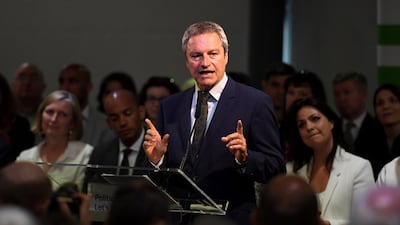My life is suddenly full of electronic beeping. It's the first thing I noticed after seven days of being … well, a politician, I suppose. ("A what?" an inner voice yells at me.) Mobile phone calls, text messages, emails arriving on my computer, various WhatsApp groups – the weird noises never seem to stop. One week ago, I joined the British political party Change UK – The Independent Group, with the aim of stopping what I see as the collective act of self-harm that is Brexit.
I never wanted to be a politician. However, Brexit has sucked the life out of my country, made us look foolish abroad and angry with each other at home. If we do exit the European Union in any way, these arguments will not stop. Brexit is not a single event – it’s a process that will go on for years, with trade negotiations, changes in our laws, concerns about the new immigration rules that will be necessary, and continuing rows about the impact on the economy.
But, as the late British prime minister Harold Wilson once said, a week in politics is a long time.
Since I announced my decision to stand in the European election, I found myself on a radio programme debating Brexit with a former Conservative MP and now Brexit party candidate, Ann Widdecombe. Ms Widdecombe has been a political activist for 50 years – half a century. By the time we debated, I had been in politics for less than 50 hours.
She thinks leaving the European Union is a great idea. I think we have proved that it is a terrible idea. But we did both agree that British politics, especially as embodied by the Conservative and Labour parties, is thoroughly broken.
Then the disagreements began. I pointed out that Ms Widdecombe had joined a political party led by Nigel Farage. He wants to dismantle Britain’s National Health Service, and replace it with an American-style insurance system. I don’t. Healthcare costs are the single biggest cause of personal bankruptcy in the US. It takes up roughly twice the proportion of America’s GDP as it does in Britain. Mr Farage is at least honest about that, and honest too about saying that Brexit will make Britain poorer. He says it is a price worth paying. Frankly, these arguments stun me. Making people poorer has never seemed to me a good idea.
Beyond the radio or TV studio arguments, I have noticed other things too. The kindness of strangers. I am astonished at how many people have written emails, contacted me in other ways or stopped me in the street to say positive things. I am even more astonished at people who said they disagreed with me, had voted for Brexit, but at least wanted to discuss in an affable manner why.
I do not know if I convinced them. I do know that the vast majority of people simply want Brexit to be over and done with, one way or another. The truth is that I would be bored with Brexit or if it were not so dangerous to the British way of life, to our ease of travel round the world, to our economy and health service and everything else I admire about Britain.
What happens now? I have no idea. Change UK is developing policies beyond Brexit, but that takes time for a new party. Brexit has proved there are no instant solutions to difficult problems – climate change, poverty, social divisions, migration, terrorism. The interesting thing is that most of these problems are international. We need to co-operate with other countries, in the EU and beyond.
And so, while we work on our policies, I think it is important to remember some basic principles. The ones I stand for are easy to say, yet not always easy to deliver: openness; inclusivity; facts; a mixed economy, in which where the public and private sectors work together; no place for hate speech.
Whether this sunny, optimistic vision of our country can withstand a political campaign – or whether I can withstand it either – well, I will let you know. But, above all, living in London, I look at my friends and neighbours. Most of them come from somewhere else – in my case from Scotland – or they have family roots somewhere else. Still, we are all Londoners.
What makes London great and makes me optimistic is that when I get on the tube, I am surrounded by talented people with links all over the world. I also notice the teenage boy helping a woman with a pushchair up the stairs from the trains, the middle-aged man and the young woman both saying they wanted to let the other have the last seat in the train carriage.
Sure, like all big-city dwellers, Londoners can be impatient and occasionally brusque. I am too – especially during rush hour. And, of course, there are the usual big-city problems. Stopping Brexit won’t solve everything, but it will cure a nagging national toothache that means we cannot think clearly about anything else. I have to go now, my phone is buzzing.
Gavin Esler is a journalist, presenter and a European parliamentary candidate for the Change UK party


